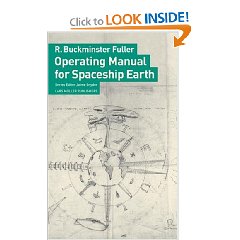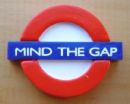
Not What I Expected But Hugely Satisfying,
R. Buckminster Fuller
I was actually expecting an Operating Manual. Although what I ended up with is a 136-page double-spaced “overview” by Buckminster Fuller, a sort of “history and future of the Earth in 5,000 words or less, bracketed by a *wonderful* introduction by grandchild Jamie Snyder, an index, a two-page resource guides, and some photos and illustrations including the Fuller Projections of the Earth.
First, the “core quote” that I can never seem to find when I need it:
OUR MISSION IS “To make the world work for 100% of humanity in the shortest possible time through spontaneous cooperation without ecological offense or the disadvantage of anyone.” Inside front cover.
The introduction is a treat–I note “impressive” and appreciate the many insights that could only come from a grandchild of and lifelong apprentice to Buckminster Fuller.
Highlights for me:
Founder of Design Science, a company by that name is now led by Medard Gabel who served as his #2 for so long. I just attended one of their summer laboratories and was blown away by the creativity and insights. It is a life-changing experience for those with a passion for Earth.
He imagined an inventory of global data. I am just now coming into contact with all of this great man's ideas, but my third book, Information Operations: All Information, All Languages, All the Time, also online at the Strategic Studies Institute in very short monograph form, is totally in harmony with this man's vision for a global inventory of global data.
“Sovereignness” was for him a ridiculous idea, and a much later work out of Cambridge agrees, Philip Allot tells us the Treaty of Westphalia was a huge wrong turn in his book The Health of Nations: Society and Law beyond the State.
“Great Pirates” that mastered the oceans as the means of linking far-flung lands with diversity of offerings was the beginning of global commerce and also the beginning of the separation between globalists who knew the whole, and specialists whom Buckminster Fuller scathingly describes as an advanced form of slave.
He was frustrated with the phrases “sunrise” and sunset” as they are inaccurate, and finally settled for “sunsight” and “suneclipse” to more properly describe the fact that it is the Earth that is moving around the sun, not the other way around.
In 1927 he concluded that it is possible for forecast with some accuracy 25 years in advance, and I find this remarkably consist with Senator Daniel Patrick Moynihan's view that it takes 25 years to move the beast–see for instance Miles to Go: A Personal History of Social Policy.
He has an excellent discussion of the failure of politics and the ignorance of kings and courtiers, noting that our core problem is that everyone over-estimates the cost of doing good and under-estimates the cost of doing bad, i.e. we will fund war but not peace.
He described how World War I killed off the Great Pirates and introduces a competition among scientists empowered by war, politicians, and religions. He says the Great Pirates, accustomed to the physical challenges, could not comprehend the electromagnetic spectrum.
He states that man's challenge is to comprehend the metaphysical whole, and much of the book is focused on the fact, in his view, that computers are the salvation of mankind in that they can take over all the automaton work, and free man to think, experiment, and innovate. He is particularly forceful in his view that unemployed people should be given academic scholarships, not have to worry about food or shelter, and unleash their innovation. I am reminded of Barry Carter's Infinite Wealth: A New World of Collaboration and Abundance in the Knowledge Era as well as Thomas Stewart's The Wealth of Knowledge: Intellectual Capital and the Twenty-first Century Organization.
There is a fascinating discussion of two disconnected scholars, one studying the extinction of human groups, the other the extinction of animal species, and when someone brings them together, they discover that precisely the same cause applied to both: over-specialization and a loss of diversity.
Synergy is the uniqueness of the whole, unpredictable from the sum of the parts or any part individually.
On page 87 he forecasts in 1969 when this book was first published, both the Bush and the Obama Administration's ease in finding trillions for war and the economic crisis, while refusing to recognize that we must address the needs of the “have nots” or be in eternal war. I quote:
“The adequately macro-comprehensive and micro-incisive solutions to any and all problems never cost too much.”
I agree. I drove to Des Moines and got a memo under Obama's hotel door recommending that he open up to all those not represented by the two party crime family, and also providing him with the strategic analytic model developed by the Earth Intelligence Network. Obviously he did not attend, and today he is a pale reflection of Bush. See the images I have loaded, and Obama: The Postmodern Coup – Making of a Manchurian Candidate.
Early on he identified “information pollution” as co-equal to physical pollution, I am totally taken with this phrase (see my own illustration of “data pathologies” in the image above). I recognize that Buckminster Fuller was about feedback loops and the integrity of all the feedback loops, and this is one explanation for why US Presidents fail: they live in “closed circles” and are more or less “captive” and held hostage by their party and their advisor who fear and block all iconoclasts less they lose their parking spot at the White House.
Most interestingly, and consistent with the book I just read the other day, Fighting Identity: Sacred War and World Change (The Changing Face of War), he concludes that wars recycle industry and reinvigorate science, and concludes that every 25 years is about right for a “scorched earth” recycling of forces.
He observes that we must preserve our fossil fuels as the “battery” of our Spaceship Earth, and focus on creating our true “engine,” regenerative renewable life and energy.
He joins with Will Durant in Story of Philosophy: The Lives and Opinions of the World's Greatest Philosophers: education is our most formidable task.
I am astonished to have him explain why the Pacific coast of the US is so avant guarde and innovative (as well as loony). He states that the US has been a melting pot for centuries, and that the West Coast is where two completely different cultural and racial patterns integrated, one from Africa and the east, the other from the Pacific and the west.
I learn that he owned 54 cars in his lifetime, and kept leaving them at airports and forgetting when and where. He migrated to renting, and concluded that “possession” is burdensome.
See also:
Ecological Economics: Principles And Applications
Plan B 3.0: Mobilizing to Save Civilization (Substantially Revised)




